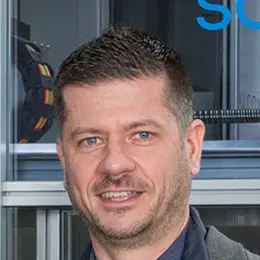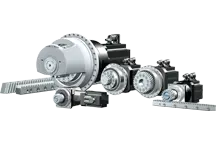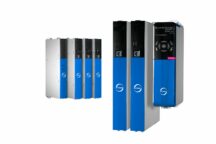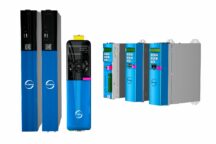
An Eye on Precision
Core drilling produces bores by machining only the circumference of the drilled hole, therefore leaving a core in the center. These holes are made with core drills or drilling machines. In houses, for example, they are required for extractor hoods, chimneys and chimney outlets, as well as for heating and ventilation ducts. Their diameters range from ten millimeters to more than one meter. They can be oriented horizontally, vertically or with different angles of inclination. The wall openings are subject to different loads: The pipes or lines running through them can become significantly heavier when liquids flow through them. The temperature also affects their expansion and elasticity. To prevent later damage to the masonry, the bores are therefore sealed – with sleeves, for example. A Swiss manufacturer of specialty fittings is very familiar with this process. “They asked us to develop a machine that can automatically assemble, bolt and label sleeves in 25 different sizes,” said Fabian Gallenbach, managing director of SOGA Gallenbach GmbH in Pforzheim.
SOGA designs and develops special-purpose solutions. Its customers come from the medical, aerospace and general industry sectors, among others. Gallenbach said: “Our vision is to enter into future-oriented partnerships with our customers through professional project management and excellent development work.” Because SOGA has focused on growth sectors, the company has been able to multiply its customer base in recent years.
The manufacturer relies on selected partners for realizing the sophisticated special-purpose machines. STÖBER Antriebstechnik GmbH + Co. KG, also headquartered in Pforzheim, has been one such partner for years.
Repeatable accuracy
“We are in regular contact with SOGA during all projects. This makes it easier to down to the details immediately for new orders,” said STOBER expert Guido Wittenauer, who supports SOGA. The drive specialist has often supported the machine manufacturer when it was seeking the right motor/gear unit combination.
In this project, the teamwork began as early as the bidding phase. The two sides discussed the critical points and worked them out together. “Before we could get started, we validated possible components during an initial project meeting and tested them in the designed installation situation,” said Gallenbach. “Due to the size of the project, we had to have some adjustments made, which the STOBER experts handled very well.”
Previously, employees had to assemble the modules by hand. This took time and was prone to errors. The new machine, on the other hand, can autonomously produce 150 parts in one piece without the intervention of a worker – and with reproducibly high accuracy. An employee only has to provide the components at the beginning of the process and transport the completely assembled sleeves away in the mesh boxes afterwards. The shortest possible setup times were important during development.
From servo motors to rack and pinion drives
The heart of the machine is a six-finger gripper. In order for it to pick up the individual parts accurately, the system must position them precisely. Threaded rings and cover washers are stored in magazines in the front part of the system. “We supplied our servo helical gear units with brakes for the high-precision lifting motion of the magazines,” Wittenauer said. Due to the helical toothing and low-friction bearing, their efficiency is particularly high.
The second part of the system contains the magazines for the threaded rings, 40 millimeter high elastomer rings and cover washers. A three-axis gantry takes over these components and uses a sensor to rotationally align them stacked on top of each other on a rotary table. “An orbital drive lets the six-finger gripper handle all components of any size – without retooling,” explained the STOBER expert. “We also supplied a synchronous servo motor for this drive.”
In the third part of the system, there is another three-axis gantry. It picks up an M6, M8 or M10 screw – depending on the size of the sleeve to be installed – with the corresponding washer and conveys it to a station that coats both components with copper. STOBER supplied the rack and pinion drives for all axes of the two gantries.
A screw-driving robot developed by SOGA takes the coated screw and screws it into the module consisting of threaded washer, cover washer and elastomer ring. It must be able to overcome fluctuating forces due to the plastic. “Our encoderless Lean motor is used for this task,” said Wittenauer. After all, highly dynamic motor controls are required for this application. The Lean motor enables speed and torque to be set variably, from a standstill to maximum speed with full torque control. The Swiss fitting manufacturer can easily retool the screw driving system with the different screw heads.
A rotary table then guides the completely assembled module to the removal station. Here, too, SOGA installed a rack and pinion drive. Wittenauer said: “Because the partially or completely assembled modules are relatively heavy, both in the removal station and in the three-axis gantries, it was necessary to design them in such a way that they could also move the heavy weights dynamically.”
Finally, the removal unit feeds the component to a marking laser. It then goes into a mesh box for pickup.
Tailor-made for every drive task
STOBER supplied the SI6 series to control the different drives. The highly dynamic drive controller with a width of only 45 millimeters is designed as a multi-axis drive system. A single SI6 can control up to two axes, a clear space advantage.” Quick DC-Link modules connect the individual devices very quickly and easily. As a result, there is no need for decentralized supply modules or fuses and cabling for each axis. The STO (Safe Torque Off) and SS1 (Safe Stop 1) safety functions are also integrated into the SI6, which are certified in this series for PLe, cat. 4 in accordance with EN 13849-1 and can be used without function tests that interrupt production.
The physical proximity naturally helped during the collaboration, as did the good personal and very cooperative contact between the companies. This made it easy to parameterize the axes on site. Gallenbach said: “We deliberately chose STOBER. It is true that we could have implemented three of the 17 motors using a different stroke system. But then other control technology would have been added. This was not an alternative for us because of the standardization.” SOGA was also excited by the option to maintain the system remotely – and to access not only the PLC machine control system, but also the STOBER drive controller network.
“We trusted STOBER for the entire duration of the project,” Gallenbach said in summary. “With presentations and plans about the progress and milestones set, we were always kept up to date. Therefore, we were very satisfied with the cooperation at all times. We embrace the same idea of permanently optimizing to get even more out of the technology.”

The physical proximity naturally helped during the collaboration, as did the good personal and very cooperative contact between the companies
“We trusted STOBER for the entire duration of the project. With presentations and plans about the progress and milestones set, we were always kept up to date. Therefore, we were very satisfied with the cooperation at all times. We embrace the same idea of permanently optimizing to get even more out of the technology.”
– Fabian Gallenbach, managing director of SOGA Gallenbach GmbH in Pforzheim
Photo credits: STÖBER Antriebstechnik GmbH + Co. KG
This might also interest you

Rack and Pinion Drives with Synchronous Servo Motors
From full rotation to linear: Innovative rack and pinion drives with synchronous servo motors from STOBER for ultra-compact, highly dynamic drive solutions.

6th Generation Drive Controllers
Tailor-made for any kind of drive task – with three mutually acombinable SC6, SI6 and SD6 series, STOBER always has the right controller on hand.

